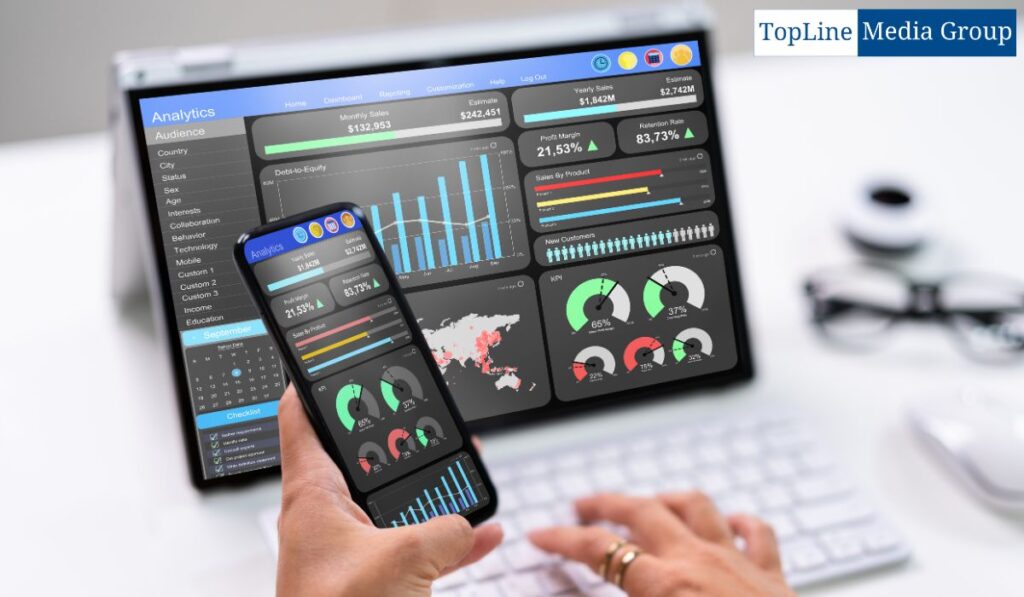Web analytics is a powerful tool that provides essential insights into your website’s performance and user behavior.
This article will explore the numerous advantages of using web analytics for businesses and individuals.
From improved decision-making to enhanced user experience, web analytics offers many benefits that can help you make data-driven decisions and optimize your online presence.
What is Web Analytics?
Before delving into the advantages, let’s understand what web analytics is.
Web analytics is collecting, measuring, and analyzing your website’s usage data.
This data can include website traffic, user behavior, conversion rates, and more.
The primary goal of web analytics is to help you understand how your website is performing and how users interact with it.
Advantages of Using Web Analytics
Improved Decision-Making
One of the primary advantages of web analytics is its ability to enhance decision-making.
You can make informed decisions about your content, marketing strategies, and user experience by analyzing user demographics, geographical locations, and traffic sources.
 Enhanced User Experience
Enhanced User Experience
Web analytics allows you to track user behavior and preferences.
This information can be used to tailor your website to meet the needs and expectations of your audience, resulting in an improved user experience.
Increased Conversions
Understanding how users navigate your site and where they drop off in the conversion funnel can increase conversions.
You can identify and rectify bottlenecks in the conversion process, ultimately boosting your conversion rates.
Targeted Marketing
Web analytics provides valuable insights into the effectiveness of your marketing campaigns.
With this data, you can target your marketing efforts more precisely and allocate your resources where they are most effective.
Competitive Advantage
Staying ahead of the competition is crucial in the online world.
Web analytics helps you benchmark your performance against competitors and identify areas where you can outperform them.
Cost Efficiency
Efficiency in resource allocation is vital for any business. Web analytics enables you to allocate your resources more efficiently by focusing on what works and eliminating what doesn’t.
Real-Time Insights
Web analytics tools often provide real-time data, allowing you to react promptly to changes in user behavior, website performance, or emerging trends.
Identifying Trends
Analyzing historical data helps you identify trends and patterns in user behavior.
This information is invaluable for making long-term strategic decisions.
Improved SEO
Search engine optimization (SEO) is critical for online visibility.
Web analytics helps you monitor the effectiveness of your SEO strategies and make necessary adjustments to improve your search engine rankings.
User Behavior Analysis
Understanding how users interact with your website is critical to improving its functionality.
Web analytics provides data on clicks, page views, and other interactions, helping optimize your site’s design.
Better Content Strategy
By analyzing the best content, you can tailor your content strategy to resonate with your audience, leading to higher engagement and conversions.
Mobile Optimization
With the growing importance of mobile devices, web analytics can help you optimize your site for mobile users, ensuring a seamless experience on all devices.
Data-Driven Approach
Web analytics promotes a data-driven approach to decision-making, reducing guesswork and ensuring that your strategies are backed by evidence.
Mitigating Risk
By monitoring user behavior and feedback, you can quickly identify and address issues, reducing the risk of reputation damage.
Conclusion
In conclusion, web analytics offers many advantages for businesses and individuals looking to succeed in the digital realm.
The benefits are extensive, from informed decision-making to improved user experience and targeted marketing.
To harness the full potential of web analytics, choosing the right tools and investing time in analyzing and interpreting the data is essential.
FAQs
What is the primary goal of web analytics?
The primary goal of web analytics is to collect and analyze data related to website usage to gain insights into user behavior, improve website performance, and make data-driven decisions.
Can web analytics benefit small businesses?
Yes, web analytics can benefit small businesses by helping them understand their audience, improve their online presence, and allocate resources more efficiently.
How do you get started with web analytics?
To get started with web analytics, you can use tools like Google Analytics, set up tracking codes on your website, and begin collecting data. Defining your goals and key performance indicators (KPIs) is also helpful.
What tools are commonly used for web analytics?
Commonly used web analytics tools include Google Analytics, Adobe Analytics, and Matomo. These tools offer various features to track and analyze website performance.
Are there any disadvantages to web analytics?
While web analytics has numerous advantages, potential disadvantages include:
- Data privacy concerns.
- The need for expertise to interpret data.
- The risk of information overload.
Careful data management and analysis can mitigate these issues.
What is the difference between web analytics and data analytics?
Web analytics primarily focuses on analyzing data related to website usage and user behavior. On the other hand, data analytics encompasses a broader spectrum of data sources and can include information from various business operations, not limited to web activities.
Can web analytics help in improving e-commerce sales?
Yes, web analytics is incredibly valuable for e-commerce businesses. It can provide insights into which products are popular, where customers drop off in the sales funnel, and how to optimize product pages for higher conversions.
Is web analytics essential for non-profit organizations and personal websites?
Web analytics can benefit non-profit organizations by helping them understand donor behavior and engagement. It’s also useful for personal websites to gauge visitor interest and improve content, even if not used for commercial purposes.
How often should I review web analytics data?
The frequency of reviewing web analytics data depends on your goals and the scale of your website. It’s common to check analytics data at least weekly, but more frequent reviews can be necessary for more significant sites or during marketing campaigns.
Can web analytics help with social media strategies?
Yes, web analytics can provide insights into the effectiveness of your social media campaigns. It can help you track traffic from social platforms, engagement levels, and the impact of social media on your overall web presence.


